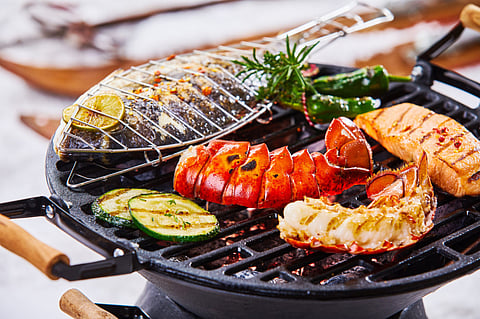More fish at 4th of July BBQs
Today is the 4th of July. In the United States, the flags, the fireworks, and, of course, the ingredients for the BBQs shared with family and friends are ready. A barbecue where, based on the annual Independence Day survey from the National Retail Federation (NRF) and Prosper Insights & Analytics, in 2023, there will be more fish.
According to Katherine Cullen, NRF VP, Industry and Consumer Insight, in the post 'How consumers are rethinking their Independence Day BBQs', this year, 53 % of those planning a gathering today said they were likely to buy some alternative to beef for their barbecues. Fish, chicken, or plant-based protein are the top substitution options being considered by U.S. consumers.
A 4th of July with less beef
No, the traditional burgers, brats, or ribs have not disappeared. In fact, they are still the most popular dishes at 4th of July BBQs. However, the NRF's annual Independence Day consumer trends survey shows that more and more Americans are considering making room for other options at their barbecues, with fish and seafood taking a prominent position to take their place.
As mentioned, according to the NRF study, 53% of consumers who were going to celebrate the 4th of July said they would probably buy something other than beef for their holiday gatherings. Instead, they would probably opt for chicken, fish, or a plant-based alternative to meat.
Conducted between June 1 and June 7, 2023, this year's survey was sent to 8225 consumers. According to its results, total spending on Independence Day food items in 2023 will be USD 9.5 billion. The figure is not only the highest in the last ten years but also shows a significantly higher than usual increase in year-to-year changes (the previous year, for example, it had risen from USD 7.5B in 2021 to USD 7.7B in 2022).
The National Retail Federation notes that in today's inflationary environment with rising prices for many basic proteins, consumers may be even more motivated to seek cheaper substitutes for traditional menu items. The survey found that among those who opted to purchase chicken, fish, or a plant-based protein for their celebrations today, half (51%) did so because of higher prices. A similar number (50%) did so because of health considerations.
Climate concerns, part of the decision for change
As said, rising beef prices or health concerns are among the main reasons why American consumers are considering changing their barbecue choices. However, like the ingredients that will be put on the grill, the reasons for this change are also more varied than one might think. Some 22% of respondents who opted out of beef – that's more than one in five – said they were doing so specifically because of climate concerns.
However, this trend highlighted by traditional 4th of July consumer intentions is not a one-off or isolated event. A recent report by NRF industry partner Kearney estimated that by 2030 many routine food choices will be influenced by climate-related issues. Just as now at 4th of July BBQs, then 83% of respondents said they would be willing to substitute beef for another protein at least once a week.
The consulting firm also asked respondents to rank the substitutions they would be willing to make to improve their personal environmental impact. Fish ranked first on the list of most likely substitutes, followed by chicken, pork, and, finally, plant-based protein.
What is remarkable about these changes is that, regardless of why they occur, consumers may end up keeping some of these climate-friendly options, even after other factors such as inflation pressures subside. And so, perhaps the salmon, the shrimp, the scallops, or whatever fish or seafood Americans put on their grills today will stay in their daily lives.


